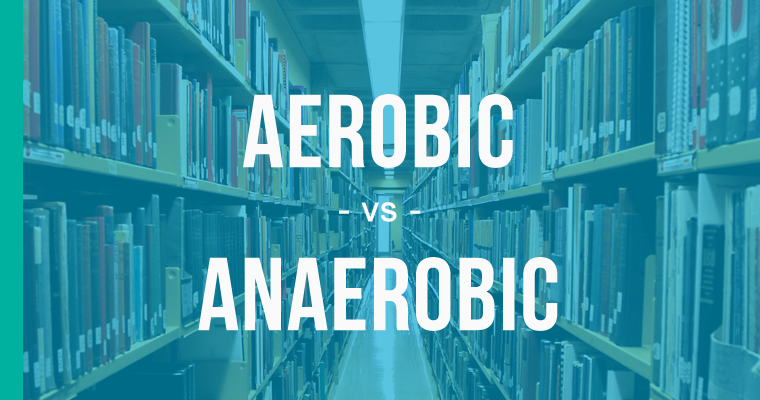Aerobic vs. Anaerobic – How to Use Each Correctly

What’s the Difference Between Anaerobic and Aerobic?
Contents
Anaerobic and aerobic sound similar, and both are used frequently in the topics of exercise and biology. However, they actually have opposite meanings. Therefore, it is very important not to confuse these two adjectives.
Anaerobic refers to the absence of oxygen. Usually this appears in the context of organisms or tissue that live without oxygen, or in high-energy exercise.
- The quickest way to lose weight is to do anaerobic exercise such as sprinting or jumping jacks.
Aerobic refers the presence of oxygen. This appears in the context of organisms or tissues that live with oxygen, or in low intensity exercise.
- Swimming and walking are both types of aerobic exercise.
Now, let’s go over a few ways you can use these words in your sentences.
Using Anaerobic in a Sentence
When to use anaerobic: Anaerobic is an adjective that describes an organism, tissue, or type of exercise that involves a lack of oxygen.
For example,
- There are some types of bacteria that can only live in anaerobic environments, such as those that cause botulism. (describing the living conditions of an organism)
- Weight lifting, specifically of very heavy weights, is a type of anaerobic exercise.
Anaerobic exercise is any high intensity, low duration exercise that causes you to run out of breath quickly. This is because your muscles need more oxygen than you can give them while exercising at such high intensity.
Using Aerobic in a Sentence
When to use aerobic: Aerobic is an adjective that describes an environment, organism, tissue, or exercise that has oxygen.
For example,
- Mammals are aerobic organisms. They need oxygen to live.
- Aerobic exercise is any exercise that a person can do for over two minutes without stopping, and it places more emphasis on endurance than speed or power.
Cardio is a synonym for aerobic exercise.
Remembering Anaerobic vs. Aerobic
It is possible to use the spelling and roots of anaerobic and aerobic to distinguish the words from one another.
Anaerobic comes from the Greek words and prefix an (meaning without), aer (meaning air), and bios (meaning life). If you can relate air to oxygen, you can remember that anaerobic is just another way of saying without oxygen to live.
Aerobic has the same meaning, but lacks the an, meaning it doesn’t include the prefix meaning without.
Outside Examples
- Two experiments — one a test of anaerobic power on exercise bikes, the other a handgrip test — showed that participants who swore while exercising exerted more power on the bikes and more strength in the grip test compared to those who used more neutral words. –New York Daily News
- Soil salinity creates an anaerobic environment that can be inhospitable for useful microbes and that can interfere with nutrient uptake in the vines — in more extreme cases, this can lead to a wine with perceptible levels of salt. –LA Times
- The group says physical activity risks during pregnancy are minimal. In fact, healthy pregnant women should be encouraged to do aerobic and strength-conditioning exercises before, during and after pregnancy. –USA Today
- He tested 26 of the athletes extensively, determining their aerobic capacity, or VO2 max, and many other measures of health and performance capability. –New York Times
Quiz: Aerobic vs. Anaerobic
Instructions: Fill in the blank with the correct word, aerobic or anaerobic, in the correct form.
- Most athletic coaches train their team members using both aerobic and anaerobic exercises. _______________ exercises build endurance while ________________ exercises build strength, power, and speed.
- Most organisms that people think of frequently, such as animals and plants, are _______________ organisms.
- Some organisms, especially some types of bacteria, are ________________________, which means they can live (or in some cases must live) without oxygen.
- Tetanus and botulism are two medical problems caused by ___________________ bacteria.
- Although some people might think fish live in an _______________ environment, they actually do get oxygen from the water.
See answers below.
Article Summary
Should I use anaerobic or aerobic? These words both refer to oxygen in the context of either organisms or exercise.
- Anaerobic refers to organisms that do not need oxygen to live or exercise that is too intense for the muscles to get oxygen.
- Aerobic refers to organisms that do need oxygen to live or exercise that allows the muscles to receive oxygen to continue to function.
These words can also describe different types of respiration within tissues, although this occurs mostly in technical, academic contexts.
Answers from Quiz
- Aerobic, anaerobic
- aerobic
- anaerobic
- anaerobic
- anaerobic
